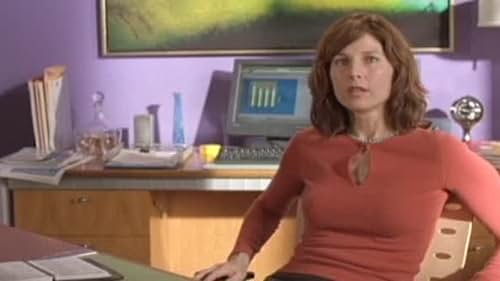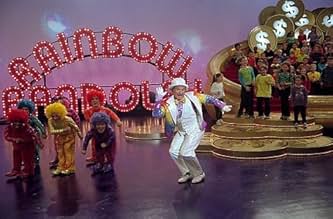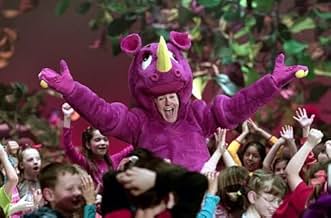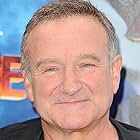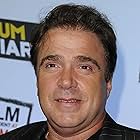A kids' show host, Rainbow Randolph, is fired in disgrace while his replacement, Sheldon Mopes, A.K.A. Smoochy the Rhino, finds himself a rising star. Unfortunately for Sheldon, the business... Read allA kids' show host, Rainbow Randolph, is fired in disgrace while his replacement, Sheldon Mopes, A.K.A. Smoochy the Rhino, finds himself a rising star. Unfortunately for Sheldon, the business of kids' television isn't all child's play.A kids' show host, Rainbow Randolph, is fired in disgrace while his replacement, Sheldon Mopes, A.K.A. Smoochy the Rhino, finds himself a rising star. Unfortunately for Sheldon, the business of kids' television isn't all child's play.
- Awards
- 2 nominations
Richard Cocchiaro
- Mitch the Thug
- (as Richard A. Cocchiaro Jr.)
- Director
- Writer
- All cast & crew
- Production, box office & more at IMDbPro
Storyline
Did you know
- TriviaWhen hosting The 78th Annual Academy Awards (2006), Jon Stewart mentioned this movie as one of his few acting jobs. He said "Welcome to the Seventy-Eighth Annual Academy Awards... hosted by me... the fourth male lead in "Death To Smoochy". Rent it."
- GoofsWhen Nora talks to Sheldon Mopes/Smoochy ('Edward Norton'), she accidentally calls him "Ed".
- Alternate versionsWhen the movie premiered on several channels such as ABC, TBS, Comedy Central or NBC, all the sexual references, offensive scenes and profanity were edited out, except other words like "damn" and "hell". The TV edited version of the film was rated TV-PG-L for mild language. 1. The Cookie Rocket Ship scene was completely removed, because of the use of the cookie that is shaped like a penis. 2. The Nazi parts (especially the Neo-Nazi Rally scene) were removed, because it was felt that it would be offensive towards Germans. 3. After the terrorist attacks on September 11, 2001, the North tower of the World Trade Center was digitally removed in the part where Rainbow Randolph was dancing on the small bench in Duane Park in Duane Street in Lower Manhattan. The North tower was still intact in the original film. 4. The part where Nora flips off Sheldon was omitted. 5. The scenes where Nora having sex with Sheldon in the changing room at KidNet Studios were removed completely. 6. In the conversation scene between Randolph and Frank Stokes in the car, the masturbating noise was muted. 7. The part where Randolph spills hot water on himself was removed, due to him saying that his balls were on fire.
- ConnectionsFeatured in Siskel & Ebert: Death to Smoochy/Panic Room/The Rookie (2002)
Featured review
Throughout the years of cinema, a certain dilemma has remained unresolved: how to market a black comedy. Elusive to categorize, it remains equally difficult to articulate exactly what such films are offering, and to which demographic. Certainly such an obstacle arose when marketing Danny DeVito's Death to Smoochy. With a misleading trailer boasting a broad comedy Robin Williams vehicle, the film was greeted as a scornful box office failure that few seemed to know how to approach and proved miles away from what they had expected. Yet this reaction proves all the more disappointing considering the rare treat the film offers - one of a steadily decreasing few which genuinely subvert viewer expectations. While far from perfect, Death to Smoochy remains the sort of fundamentally bizarre yet gloriously daring picture which seldom makes it to theatres, offering a gleefully warped, macabre wit almost guaranteed to please those willing to take it for what it is.
The fact that the word 'death' being present in the title of a mainstream comedy is a rarity should be indicative of exactly how offbeat and downright sinister the film is. Despite a sparkly visual palate of pastel colours, the film could hardly be more dark tonally, with its infusion of frequent brutal violence and sadistic, uncomfortable humour making it about the farthest thing away from the safe, mainstream comedy its trailer attempted to depict. Yet its shady sensibilities cannot possibly quench the film's manic, wickedly sadistic wit, and the enormously quotable screenplay delivers such a varied slew of humour that the viewer cannot help but consistently be caught by surprise. DeVito amplifies such an ambiance with bizarre, off-kilter camera-work and a continuous transitioning from satire to the deadly serious to goofy slapstick and back again, leaving the viewer uncertain when to roar with laughter or to cringe uncomfortably. In fact, the blurring between the two becomes poignantly indiscernible, with DeVito seemingly impishly suggesting that whether cinema makes us laugh or cringe, either way it does not deter our fascination with watching, and that perhaps the boundary becomes simply redundant in the end.
Nonetheless, as fresh as such a fusion of the comedic and the grotesque may be, the lack of obvious prerequisites also results in Death to Smoochy suffering from certain design flaws. The film starts off as a devilish satire of network television, with Norton's sickeningly wholesome entertainer Sheldon Mopes thrust into the fish out of water figure in a sea full of greedy, merchandise obsessed execs. Yet about halfway through DeVito loses his pace, and the film begins to feel more like a chaotic jumble, continually stuffing in new characters and plot twists, and with at least three seeming climaxes uneasily leading into further narrative development. Similarly, the film's treatment of Robin Williams' vengeance obsessed TV host Rainbow Randolph remains equally indecisive. Perhaps due to Williams' star casting, DeVito appears to struggle with exactly what to do with the character, whether to situate him as protagonist or depraved quasi-antagonist. As such, Randolph appears uncomfortably stuck between the two, and the film's ensuing rocky focalization makes it harder for the viewer to maintain their emotional bearings. The addition of a rather conventional romantic subplot also feels somewhat out of place in so uniformly dark and vindictive a picture, making the third act feel all the more unnecessarily chaotic. Nonetheless, despite this mishmash of content, somehow DeVito's loopy pace and zany, twisted sense of humour never quite loses the audience even at its most imbalanced, but instead only becomes more bizarre (often appealingly so) without sacrificing the entertainment front.
DeVito also delights in inverting the typical characters his stars would play, resulting in a deliciously unconventional tweaking of expectations. Despite the publicity hyping Williams, Edward Norton is the most firmly situated as the film's 'main character', which works, as Norton is unreasonably hilarious, superbly counteracting his usual intensity as charming yet irritatingly well intentioned children's entertainer Smoochy the Rhino, who goes out of his way to refuse merchandising money in favour of promoting organic, sugar free foods and respecting hostile step-parents on children's television. Norton is careful to keep the character crucially likable, even at his most simperingly moronic, crafting an enduring emotional centre and grounding the calamity of the film around him. Similarly, fans of Robin Williams' less family sanctioned stand-up act will be enthralled by his performance as unhinged Rainbow Randolph. Retaining his usual flair for colourful improvisation, Williams lets loose in a twisted, exceedingly dark fashion barely glimpsed before, and while he unquestionably rockets light years past being over the top, his slew of bitter, incensed, profanity-fraught rants are just about worth watching the film by themselves.
Catherine Keener's credible charisma and warmth also help acclimatize a shaky character transition from nihilistically jaded producer to earnest, hopeful young woman, making the potentially weakest point of the film instead burst to life with a quirky spark. Danny DeVito himself delivers a familiar but still enjoyable lampoon of the greedy agent figure, and an early performance by TV comic Jon Stewart delivers a tantalizing taste of a gestating talent. The film also offers a collection of memorable character bits worthy of the Coen brothers, from Michael Rispoli's blustering, often incomprehensible lovable nitwit of a former boxer, Danny Woodburn's sardonic children's television actor, and an utterly hilarious Vincent Schiavelli as a narcoleptic, heroin addict assassin.
While certainly not for all tastes, Death to Smoochy delivers a unique, daringly morbid and raucously hilarious product which manages to continually dodge expectations while remaining enjoyable. While its unfavourable reaction is perhaps typical of so unconventional a picture, such a rare delight deserves to be enjoyed and appreciated, flaws and all, and those willing to take in a different kind of comedy are unlikely to be disappointed.
-8/10
The fact that the word 'death' being present in the title of a mainstream comedy is a rarity should be indicative of exactly how offbeat and downright sinister the film is. Despite a sparkly visual palate of pastel colours, the film could hardly be more dark tonally, with its infusion of frequent brutal violence and sadistic, uncomfortable humour making it about the farthest thing away from the safe, mainstream comedy its trailer attempted to depict. Yet its shady sensibilities cannot possibly quench the film's manic, wickedly sadistic wit, and the enormously quotable screenplay delivers such a varied slew of humour that the viewer cannot help but consistently be caught by surprise. DeVito amplifies such an ambiance with bizarre, off-kilter camera-work and a continuous transitioning from satire to the deadly serious to goofy slapstick and back again, leaving the viewer uncertain when to roar with laughter or to cringe uncomfortably. In fact, the blurring between the two becomes poignantly indiscernible, with DeVito seemingly impishly suggesting that whether cinema makes us laugh or cringe, either way it does not deter our fascination with watching, and that perhaps the boundary becomes simply redundant in the end.
Nonetheless, as fresh as such a fusion of the comedic and the grotesque may be, the lack of obvious prerequisites also results in Death to Smoochy suffering from certain design flaws. The film starts off as a devilish satire of network television, with Norton's sickeningly wholesome entertainer Sheldon Mopes thrust into the fish out of water figure in a sea full of greedy, merchandise obsessed execs. Yet about halfway through DeVito loses his pace, and the film begins to feel more like a chaotic jumble, continually stuffing in new characters and plot twists, and with at least three seeming climaxes uneasily leading into further narrative development. Similarly, the film's treatment of Robin Williams' vengeance obsessed TV host Rainbow Randolph remains equally indecisive. Perhaps due to Williams' star casting, DeVito appears to struggle with exactly what to do with the character, whether to situate him as protagonist or depraved quasi-antagonist. As such, Randolph appears uncomfortably stuck between the two, and the film's ensuing rocky focalization makes it harder for the viewer to maintain their emotional bearings. The addition of a rather conventional romantic subplot also feels somewhat out of place in so uniformly dark and vindictive a picture, making the third act feel all the more unnecessarily chaotic. Nonetheless, despite this mishmash of content, somehow DeVito's loopy pace and zany, twisted sense of humour never quite loses the audience even at its most imbalanced, but instead only becomes more bizarre (often appealingly so) without sacrificing the entertainment front.
DeVito also delights in inverting the typical characters his stars would play, resulting in a deliciously unconventional tweaking of expectations. Despite the publicity hyping Williams, Edward Norton is the most firmly situated as the film's 'main character', which works, as Norton is unreasonably hilarious, superbly counteracting his usual intensity as charming yet irritatingly well intentioned children's entertainer Smoochy the Rhino, who goes out of his way to refuse merchandising money in favour of promoting organic, sugar free foods and respecting hostile step-parents on children's television. Norton is careful to keep the character crucially likable, even at his most simperingly moronic, crafting an enduring emotional centre and grounding the calamity of the film around him. Similarly, fans of Robin Williams' less family sanctioned stand-up act will be enthralled by his performance as unhinged Rainbow Randolph. Retaining his usual flair for colourful improvisation, Williams lets loose in a twisted, exceedingly dark fashion barely glimpsed before, and while he unquestionably rockets light years past being over the top, his slew of bitter, incensed, profanity-fraught rants are just about worth watching the film by themselves.
Catherine Keener's credible charisma and warmth also help acclimatize a shaky character transition from nihilistically jaded producer to earnest, hopeful young woman, making the potentially weakest point of the film instead burst to life with a quirky spark. Danny DeVito himself delivers a familiar but still enjoyable lampoon of the greedy agent figure, and an early performance by TV comic Jon Stewart delivers a tantalizing taste of a gestating talent. The film also offers a collection of memorable character bits worthy of the Coen brothers, from Michael Rispoli's blustering, often incomprehensible lovable nitwit of a former boxer, Danny Woodburn's sardonic children's television actor, and an utterly hilarious Vincent Schiavelli as a narcoleptic, heroin addict assassin.
While certainly not for all tastes, Death to Smoochy delivers a unique, daringly morbid and raucously hilarious product which manages to continually dodge expectations while remaining enjoyable. While its unfavourable reaction is perhaps typical of so unconventional a picture, such a rare delight deserves to be enjoyed and appreciated, flaws and all, and those willing to take in a different kind of comedy are unlikely to be disappointed.
-8/10
- How long is Death to Smoochy?Powered by Alexa
Details
- Release date
- Countries of origin
- Official site
- Language
- Also known as
- Вбити Смучі
- Filming locations
- Production companies
- See more company credits at IMDbPro
Box office
- Budget
- $50,000,000 (estimated)
- Gross US & Canada
- $8,364,691
- Opening weekend US & Canada
- $4,266,463
- Mar 31, 2002
- Gross worldwide
- $8,382,938
- Runtime1 hour 49 minutes
- Color
- Sound mix
- Aspect ratio
- 1.85 : 1
Contribute to this page
Suggest an edit or add missing content







